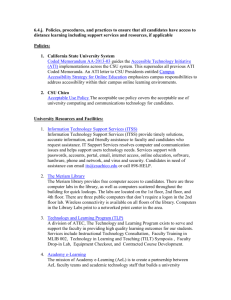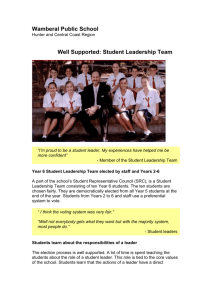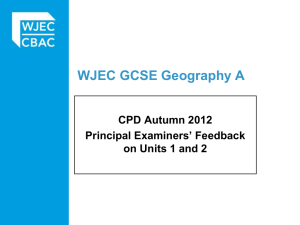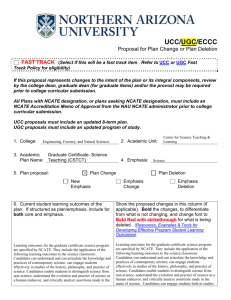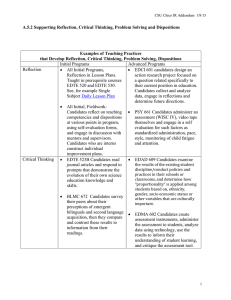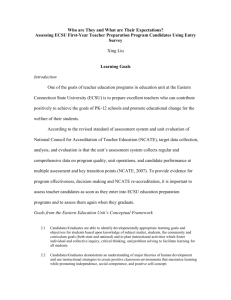METHODS OF TEACHING VOCAL AND INSTRUMENTAL MUSIC IN
advertisement
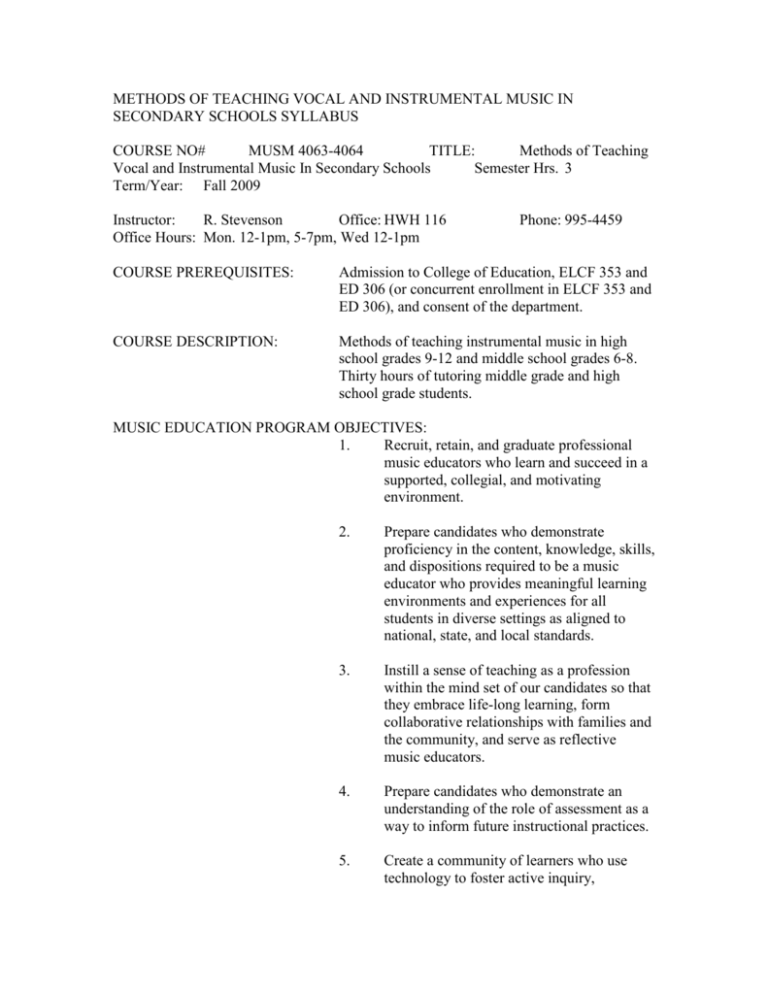
METHODS OF TEACHING VOCAL AND INSTRUMENTAL MUSIC IN SECONDARY SCHOOLS SYLLABUS COURSE NO# MUSM 4063-4064 TITLE: Methods of Teaching Vocal and Instrumental Music In Secondary Schools Semester Hrs. 3 Term/Year: Fall 2009 Instructor: R. Stevenson Office: HWH 116 Office Hours: Mon. 12-1pm, 5-7pm, Wed 12-1pm Phone: 995-4459 COURSE PREREQUISITES: Admission to College of Education, ELCF 353 and ED 306 (or concurrent enrollment in ELCF 353 and ED 306), and consent of the department. COURSE DESCRIPTION: Methods of teaching instrumental music in high school grades 9-12 and middle school grades 6-8. Thirty hours of tutoring middle grade and high school grade students. MUSIC EDUCATION PROGRAM OBJECTIVES: 1. Recruit, retain, and graduate professional music educators who learn and succeed in a supported, collegial, and motivating environment. 2. Prepare candidates who demonstrate proficiency in the content, knowledge, skills, and dispositions required to be a music educator who provides meaningful learning environments and experiences for all students in diverse settings as aligned to national, state, and local standards. 3. Instill a sense of teaching as a profession within the mind set of our candidates so that they embrace life-long learning, form collaborative relationships with families and the community, and serve as reflective music educators. 4. Prepare candidates who demonstrate an understanding of the role of assessment as a way to inform future instructional practices. 5. Create a community of learners who use technology to foster active inquiry, collaboration, engaged interaction, and creative expression for diverse learners, their families, and the community. STUDENT PROGRAM OUTCOMES: 1. COURSE OBJECTIVES: OBJECTIVE NO. Candidates will demonstrate a high level of knowledge in Music Education. 2. Candidates will demonstrate the ability to develop instruction plans for teaching in Music Education. 3. Candidates will demonstrate the ability to perform selected music in a chosen medium. 4. Candidates will possess a knowledge of music in an historical and cultural context. 5. Candidates will possess a theoretical knowledge of music, including applicable aural skills. 6. Candidates will demonstrate a suitable level of keyboard skills. 1. To study current theories of learning and teaching music grades 6-12 2. To develop techniques for teaching music Grades 6-12 3. To share, discuss and evaluate the knowledge and music teaching experiences of class members 4. To develop and evaluate teaching materials 1. The students will read and discuss various theories of teaching music The students will read and discuss historical and current trends in music education 2. The students will develop lesson plans and practice teaching lessons to mock classes and to students at their assigned field based sites 3. Students will discuss the delivery of mock and actual lessons The students will discuss meaningful aspects of their field experience The students will observe and discuss the performance of other teachers 4. The students will develop materials to be used in teaching general music courses, performances classes and team taught courses. The students will use and evaluate Computer Assisted Instructional Materials ETHICS POLICY: We assume that all students are responsible for their work unless proven otherwise. Plagiarism on exams will not be tolerated. Anything you turn in as a part of an exam must be your own work. Cheating on an exam will result in an automatic F in the course. Ethical questions become a little fuzzy when it comes to homework assignments and course projects. Consultation between students on homework problems and reports is encouraged, however, identical solutions will be considered a plagiarized work and no credit will be given to either of the students that turned in identical work. Any work copied from a book or journal or another student without a reference is considered plagiarized and no credit will be given for that particular activity. Cutting and pasting text from the Internet is plagiarism and will be treated as such. ADA POLICY: The Department of Music is strongly committed to taking all reasonable steps to ensure that our students are able to work to their fullest potential. Reasonable Accommodation: Students with disabilities who require reasonable accommodation to fully participate in this course should notify the instructor within the first two weeks of the semester. Such students must be registered with the Abilities Office of Disabled Student Services, CRSU 190, and (773) 995-4401. EVACUATION PROCEDURE REQUEST: In order to maximize emergency preparedness, students who may need assistance in evacuating the building are asked to inform their instructors at the beginning of each semester. This request is made only to improve the safety of all members of the CSU community. DIVERSITY STATEMENT: The College of Arts and Sciences is an academic community that values diversity and aims for intercultural competence. Diversity in the College is an inclusive value that encompasses race and ethnicity, nationality, religion/belief, gender, sexual orientation, sexual identity and gender expression, age, ability, socio-economic status, and other aspects of identity. The diversity of our campus community contributes to the richness of our scholarship and campus life. As a campus community, we believe that every individual is important in a unique way and contributes to the overall quality of the institution. We are committed to recruiting and retaining diverse faculty, staff, and students, and to fostering a learning environment which draws strength from, celebrates, and honors diversity. We strive to eliminate prejudice and discrimination; to respect the dignity of all people; and to learn from differences in people, ideals, experiences and opinions. BACKGROUND CHECK POLICY STATEMENT: Effective Fall 2009, the College of Education requires that all students participating in field placement experiences with individuals under the age of 21, either on or off campus, provide proof of “cleared” fingerprint criminal background check results before beginning the first field experience, and prior to admission to the College of Education. This is consistent with the state law that requires Illinois school districts to conduct criminal background investigations of applicants for certified and non-certified positions. CONCEPTUAL FRAMEWORK: The Bachelor of Music Education program is offered by the Department of Music in collaboration with the College of Education. All activities are guided by the belief that we Prepare All Candidates To Succeed, which translates into the PACTS acronym. The PACTS acronym also represents the strands for the College of Education’s Conceptual Framework, which serves as a model for how the College of Education prepares all candidates to succeed in helping urban children learn. This preparation is characterized and distinguished by five core themes: (P) Professionalism, (A) Assessment, (C) Content, (T) Technology, and (S) Standards. The Pacts Conceptual Framework supports the mission statements of the Department of Music [http://www.csu.edu/music/visionandmissionstatement.htm], the College of Education [http://www.csu.edu/CollegeofEducation/] and the University [http://www.csu.edu/strategicplanningresources/missionstatement.htm]. PROFESSIONAL STANDARDS: National Association of Schools of Music http://www.nasm.arts-accredit.org National Council for Accreditation of Teacher Education (NCATE) http://www.ncate.org Illinois Professional Teaching Standards (IPTS) http://www.isbe.state.il.us/profprep/pdfs/ipts.pdf Illinois Core Language Arts Standards (CLA) www.isbe.net/profprep/CASCDvr/pdfs/24110_corelangarts_std.pdf Chicago State University Conceptual Framework PACTS Strands http://www.csu.edu/College of Education COURSE REQUIREMENTS: Attendance, class participation, field experience, 10-page research paper, class assignments, assigned readings, mid-term and final exams CRITERIA FOR GRADING: Attendance 10% Class participation 10% Field experience 10% 10 page research paper APA 20% Due 11/14/09 style Topic due 10/6/09 Class Assignments 10% Oral Presentations 10% Assigned readings 10% Mid-term and final exams 20% A passing grade at mid term does not guarantee a passing grade in this class. GRADING POLICY: A=100%-94% B=93%-88% C=87%-80% D=79%-72% F=71%-below REQUIRED TEXT: Charles.R. Hoffer, Teaching Music In The Secondary Schools. Wadsworth
